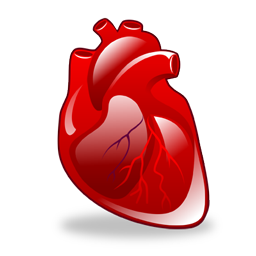What is a heart attack?
Heart attack is the death of a segment of heart muscle caused by
the loss of blood supply.
The blood supply is usually lost because a coronary artery, one
that supplies blood to the heart muscle, is blocked by a blood clot (coronary
thrombosis). If some of the heart muscle dies, the patient experiences chest
pain and electrical instability of the heart muscle tissue.
Heart Attack Symptoms
Symptoms of a heart attack include:
· Discomfort, pressure,
heaviness, or pain in the chest, arm, or below the breastbone
· Discomfort radiating
to the back, jaw, throat, or arm
· Rapid or irregular
heartbeats
What Do I Do if I Have a Heart Attack?
After a heart attack, quick treatment to open the blocked artery
is essential to lessen the amount of damage. At the first signs of a heart
attack, call for emergency treatment . The best time to treat a heart attack is
within one to two hours of the first onset of symptoms. Waiting longer
increases the damage to your heart and reduces your chance of survival.
Keep in mind that chest discomfort can be described in many
ways. It can occur in the chest or in the arms, back, or jaw. If you have
symptoms, take notice. These are your heart disease warning signs. Seek medical care immediately.
The following are possible factors associated with increased
risk of heart attack.
· Age: Risk
increases when a man is over 45, and a woman is over 55.
· Angina: An
illness where not enough oxygen reaches the heart, causing chest pain
resembling a heart attack, but it resolves after taking medication. Angina raises the risk
of a heart attack.
· High blood cholesterol
levels: Increases the risk of developing blood clots in the arteries.
· Diabetes: People
with diabetes have a higher risk of developing several diseases and
conditions, many of them contribute to a higher risk of heart attack.
· Diet: Someone who
consumes large quantities of, for example, saturated fats, will eventually have
a higher risk of having a heart attack.
· Genes: You can
inherit a higher risk of heart attack.
· Heart
surgery: Patients who have had heart surgery have a higher risk.
· Hypertension (high
blood pressure).
· Obesity, overweight.
· Physical
inactivity: More active people have a lower risk.
· Previous heart
attack: Anybody who has already had a heart attack is more likely to have
another one, compared with people who have not.
· Smoking.
· Work
stress: Individuals with stressful jobs, or shift workers have an
increased risk of heart attack.


Comments
Post a Comment